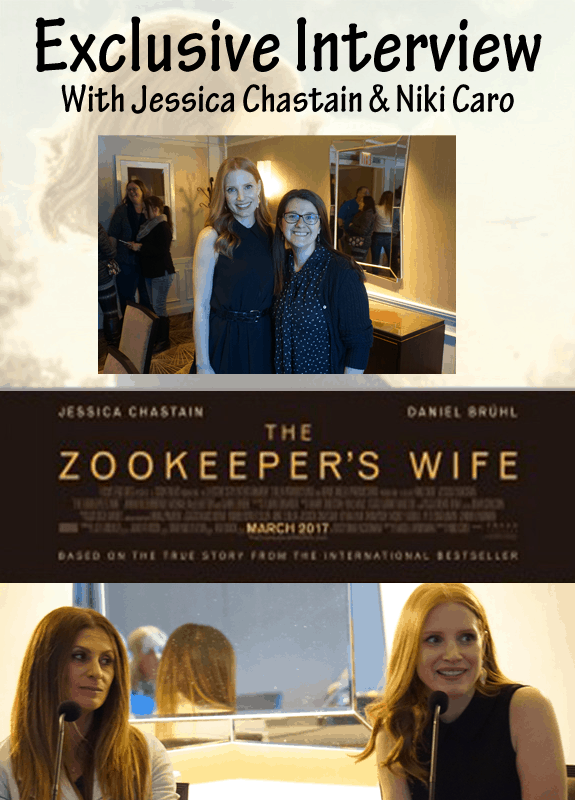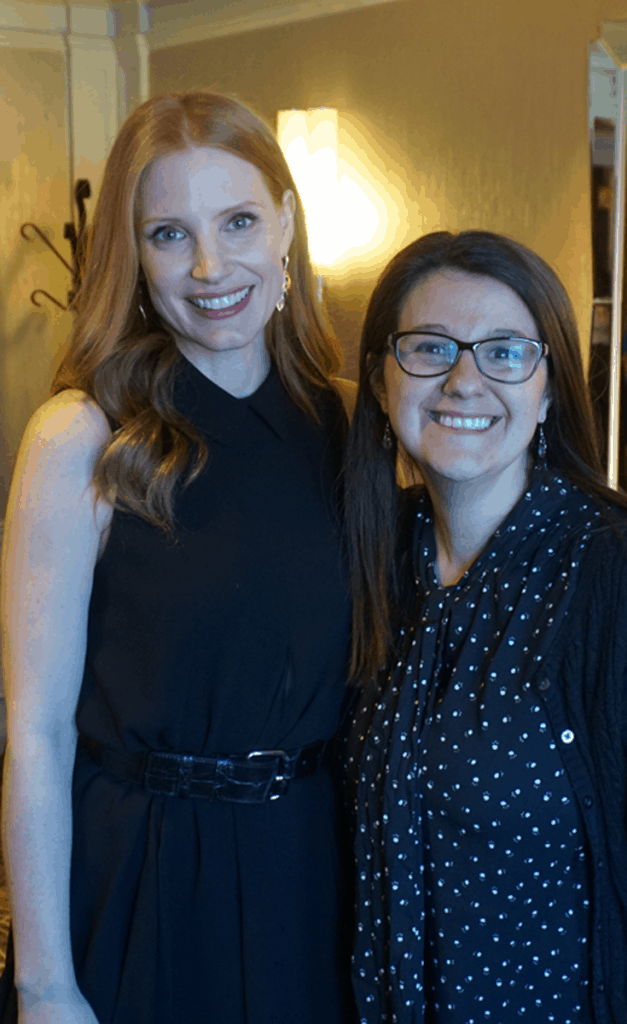When it comes to creating movies it is always about the storyline and the passion that the directors and story writers are able to bring to the big screen. What if the story is real? What if the story helped change history and helps restore today’s faith in humanity? That is what the director, Niki Caro, and lead actress, Jessica Chastain, did in their newest movie called “The Zookeeper’s Wife”.
I was blessed to sit down this these two talented ladies a couple of weeks ago after attending an early screening in New York City to interview them. I was joined with other bloggers across the US and the questions and answers were beautiful and inquisitive about the characters and the story! I am blessed that expenses of this trip were covered by our friends from Focus, and they allowed me to share all my own opinions and experiences with all of you!

It is tough to avoid politics and political sides but when we have a story with a real life hero that went out to save lives a good person will always be on that side of humanity. This is who Jessica Chastain played in the film. Just like I never want to forget 9/11 I know that the world should never want to forget WW2. This war was nasty and it is amazing that a lady can have so much heroism to help save the lives while risking hers from the evil of the world.
The Zookeeper’s Wife Interview
Here are some of the highlights from our interview.
Was that the first time you held a lion cub? What length did you go to do research for this role?
Jessica: It definitely is the first time I’ve ever held a lion cub. So just – to the research – of course, I started with the book, because the film is based on the bestselling, incredible novel, which is then based on Antonina’s journals. I went to Warsaw, met with Theresa. She took me to the Warsaw Zoo, and I got to ask her secrets that weren’t in the book. Things like – if Antonina wasan animal, what kind of animal would she be? Like, just these strange – and she said, “Oh, definitely a cat. She’d be a little puma.” Which is why Jan calls her Punia – that was a nickname which means little cat – little – yeah. So all those little things. And then I went to Auschwitz. Of course, Antonina wouldn’t have known what was happening there, but I just wanted to feel the energy of the space. And then I met with a lot of people who spend their lives dedicated to animals. And that was so helpful when approaching this film, because the thing that I learned most from everyone was not to impose your energy onto an animal; not to treat an animal as though it’s your possession, or it’s an object. It’s a spiritual being – just, I guess, what this film is, too – like, whether human or animal, they are not ours to possess.
We asked about the character of Ursela. I don’t want to give you any spoilers but there were 300 people captured and this was a story that they felt they needed in the movie and it was made up. It holds truth to the way some people were treated.
NIKI CARO: Yeah. The character of Ursula is emblematic of all children who are hurt by war. And so as the director of this movie, I had to think very hard about what I could bring to this genre. And I recognized that it was femininity; that I could take my inspiration from Antonina, and be very soft, and very strong with this material. And so Ursula was a very, very important character, because her experience had made her animal – it’s an incredible performance, obviously; young Israeli actress called Shira Haas.
NIKI CARO: You know, it was incredibly organic, actually, the whole – the whole movie was. But in that scene, in particular, there was a bunny. And the bunny is – really shows us the healing power of animals – that it’s a little bunny that can break through for this girl. And that’s Antonina’s gift, really, to know, you know, without words, without overt action, just what to do in that moment. And Jessica absolutely has that gift herself, as a human being. So – which really made my job very, very easy.
Did you have a favorite animal to work with? And were you worried about that elephant scene?
JESSICA CHASTAIN: Ah. Well, speaking of the elephant scene – the elephant might have been my favorite animal to work with. The first time I met – her name was Lily. And the first time I met Lily, we were in this field. It was before we started shooting. And there was this little tiny string that was kind of like the fence between us, but it was a string. And she knew not to cross it. And she was, you know, finding leaves and looking for food. So I was like, “Oh, okay.” So I was on my side. I was like, “I’m gonna find some for you.” (Jessica talked about how the created the scene by hiding apples…)
Jessica, what drew you to, and how did you get involved in the project?
JESSICA CHASTAIN: I – well, I was sent the script. And I was really inspired by the story, and I went online. I was like, “Is this true?” – you know, the thing I normally start with first. Like, “This is true – and why isn’t anyone talking about Antonina.” And then I met Niki in Milan. We had a fun coffee.
NIKI CARO: I know, it sounds so – it was really glamorous – yeah.
JESSICA CHASTAIN: Yeah.
NIKI CARO: Like, Milan frequently isn’t, but that was – that was a beautiful day.
JESSICA CHASTAIN: Yeah. I was excited to meet Niki, because I so love her film work. And I – I mean, I can’t imagine anyone else directing this movie. She’s so honest. And she’s so authentic.
In the movie there is a cage scene. We asked about it because it was a very dramatic part of the film. We learned it was something Niki wanted to try out and it really worked for the movie.

The real-life story of one working wife and mother who became a hero to hundreds during World War II. In 1939 Poland, Antonina Żabińska (portrayed by two-time Academy Award nominee Jessica Chastain) and her husband, Dr. Jan Żabiński (Johan Heldenbergh of “The Broken Circle Breakdown”), have the Warsaw Zoo flourishing under his stewardship and her care. When their country is invaded by the Nazis, Jan and Antonina are stunned – and forced to report to the Reich’s newly appointed chief zoologist, Lutz Heck (Daniel Brühl of “Captain America: Civil War”). To fight back on their own terms, Antonina and Jan covertly begin working with the Resistance – and put into action plans to save lives out of what has become the Warsaw Ghetto, with Antonina putting herself and even her children at great risk.
Claudia Krusch says
These are great questions. I am excited to go see The Zookeepers Wife with my girlfriends.
Angela B. says
I love to read the back stories about movies before I watch them. Honestly I probably would have never even been interested in this specific movie before reading your post. Thank you so much for sharing. This is definitely on my must watch list now
Ashley says
This movie looks great. I can’t wait to see it. How cool you were able to interview them!
Lois Alter Mark says
I absolutely adored – and sobbed through – this movie. Jessica Chastain is one of my favorites, and I would have loved to have met her in person!
Jennifer says
This book is on my TO READ PILE. Once I finish that, I will definitely need to watch this movie. Thanks for sharing your interview with your readers.
Scott says
I hadn’t heard of this film, but your description has piqued my interest. Watching the trailer right now!
Pamela @ Still Dating My Spouse says
How exciting to interview a celebrity. The movie sounds interesting. I will add it to our date night rotation so we can go see it when it hit theaters.
Cristine says
I love how movies can bring unknown stories into the discussion. I’ve never heard of this story and I think everyone should try to see it.
Monica (NYCTechMommy) says
The Zookeepers wife seems like a great movie! Such a powerful story. I got to see the trailer the other day and I can’t wait to see the movie. Great job on interviewing Jessica Chastain. Love her!